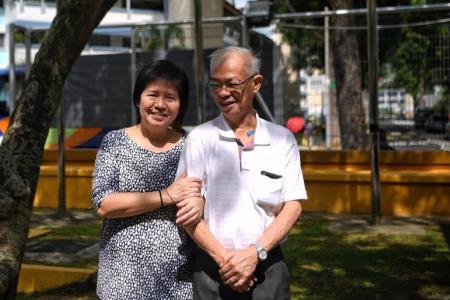Stroke campaign showing results
More people seeking treatment within critical window
More people are seeking emergency treatment for stroke within the crucial time period, a local study of 240 people has found.
Following the first Stroke Awareness Campaign last year, 41 per cent of people in the study sought treatment at two public hospitals - Singapore General Hospital and Tan Tock Seng Hospital - within 3½ hours and 58 per cent within seven hours.
This is an improvement on 28 per cent and 42 per cent respectively in the three months before the campaign started.
Getting to hospital within this window is critical, as certain stroke treatments are time-sensitive.
When it comes to stroke, doctors typically have two options - to dissolve the blood clot causing the stroke, or use a minimally invasive technique to remove it from the body.
However, the first method can be carried out only within 4½ hours and the second within six to eight hours.
If left untreated, a stroke can cause brain damage leading to permanent disability or even death.
One in six people here will have a stroke in their lifetime, with the chances going up as they age. Stroke is also the fourth leading cause of death here, with some 8,000 strokes recorded yearly.
The findings of the study, which was led by the National Neuroscience Institute, were announced yesterday at the launch of this year's Stroke Awareness Campaign.
The campaign aims to get more people aware of the telltale signs - facial drooping, arm weakness and difficulty speaking - that a stroke is happening.
Those who experience such symptoms should call an ambulance immediately.
"All of us can and should do our part by learning about stroke and the measures that can be adopted to help ourselves and those around us," said Senior Minister of State Amy Khor, who was the event's guest of honour.
One of those who spotted the problem early was Madam Lee Hui Theng, 57, whose husband suffered a stroke in 2015.
They were taking a break from shopping and she asked him if he wanted a drink, but he did not respond.
When she took him to a quiet corner to rest, she realised that he seemed to have difficulty walking on one side.
"It happened very fast," she said. "I thought it was a heart problem at first, and I called the ambulance."
Thanks to her quick thinking, Mr Lim Huah Yong, 68, survived and suffers no problems except minor issues with memory.
Added Mr Lim: "It could have been much worse for me."
Get The New Paper on your phone with the free TNP app. Download from the Apple App Store or Google Play Store now


